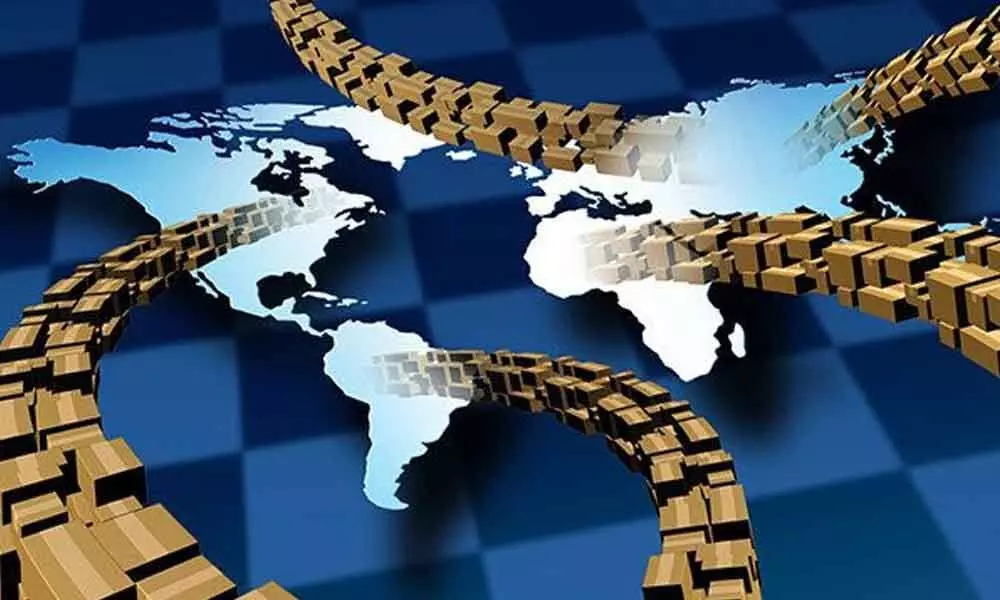Live
- Teachers are pillars of social development: Sudheer Reddy
- Sandhya Theater Stampede Incident: Rahul Ramakrishna Retracts Comments on Issue
- Ramanujan’s contributions to Mathematics hailed
- Garena Free Fire MAX Redeem Codes for December 2024: Unlock Skins, Weapons, and More
- Dr. Ponguleti Sudhakar Reddy Welcomes Union Minister Piyush Goyal in Bengaluru
- Why Christmas is Celebrated on December 25: The Link to Roman Festivals
- Tributes paid to G Venkataswamy (Kaka)
- Amit Shah should quit; demand MP, MLA
- Hike in support price brings cheer to coconut farmers
- Apple's Face ID Smart Doorbell Could Unlock Doors by Late 2025
Just In

The commerce ministry is considering rationalising and simplifying certain export promotion schemes such as EPCG in the next foreign trade policy, which provides guideline and incentives for increasing shipments, an official said.
New Delhi: The commerce ministry is considering rationalising and simplifying certain export promotion schemes such as EPCG in the next foreign trade policy, which provides guideline and incentives for increasing shipments, an official said.
The ministry is in consultation with all stakeholders for the preparation of the next policy (2020-25), as the validity of the old one ends on March 31, 2020, the official said.
The ministry may also include new chapters for services and e-commerce exports besides simplifying advance authorisation and self-ratification schemes.
EPCG is an export promotion scheme under which an exporter can import certain amount of capital goods at zero duty for upgrading technology related with exports.
On the other hand, advance authorisation is issued to allow duty free import of inputs, which is physically incorporated in export product.
Total exports of third party could be counted as export obligation instead of only proceeds realised from third party by EPCG holders, the official said.
Similarly, in the advance authorisation scheme, export obligation period could be enhanced from the current 18 months. For the export-oriented units, the ministry is considering getting policy formulation, regulation and administration under one roof. The ministry's arm directorate general of foreign trade (DGFT) is formulating the policy.
At present, tax benefits are provided under merchandise export from India scheme (MEIS) for goods and services export from India scheme (SEIS).
In the new policy, changes are expected in incentives given to goods as the current export promotion schemes are challenged by the US in the dispute resolution mechanism of the World Trade Organisation (WTO).
Against this backdrop, the government is recasting the incentives to make them compliant with global trade rules, being formulated by Geneva-based WTO, a 164-nation multilateral body.
Exporters are demanding incentives based on research and development, and product-specific clusters under the new policy.
Ludhiana-based Hand Tools Association President S C Ralhan said the new policy should have provisions for refund of indirect taxes like on oil and power, and state levies such as mandi tax.
During April-September 2019, exports were down 2.39 per cent to $159.57 billion while imports contracted by 7 per cent to $243.28 billion.
Trade deficit during the period narrowed to $83.7 billion as against $98.15 billion in April-September 2018-19. Since 2011-12, India's exports have been hovering at around $300 billion.
During 2018-19, overseas shipments grew 9 per cent to $331 billion. The government is targeting to increase the exports to $one trillion in coming years.

© 2024 Hyderabad Media House Limited/The Hans India. All rights reserved. Powered by hocalwire.com







